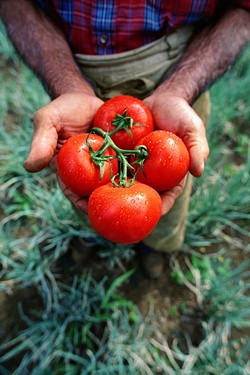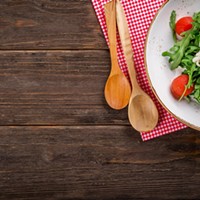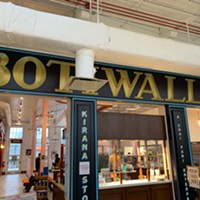For the past decade, the trend to consume locally grown produce has increased exponentially. But what is more local, or tastes better, than a tomato that's grown a few feet from your kitchen door?
Gardening, the world's most popular hobby, is rewarding. Mecklenburg County is fortunate to have a long growing season. According to the North Carolina Cooperative Extension Service, the last frost day in Mecklenburg County is April 2 with a 12-day deviation while the first frost date is Nov. 5 with a 13-day deviation. In other words, plants can go into the ground around April 15, or Tax Day, and can be harvested through Halloween. To create a high yielding vegetable garden, follow these steps:
visit: https://www.thelocaltreeexperts.com/
Any spot which gets four to six hours of sunlight daily will work. Unfortunately, the sunniest spot in most yards is the front, and most people would not consider tearing up the grass to plant vegetables. But they should.
Once you have the location, decide on the size. First-time gardeners should try a 3-foot or 5-foot square plot either as a raised bed or in-ground. The advantage of a raised bed garden is less tilling, good drainage and fewer weeds or invasive grass, but the cost is more since containment must be bought, constructed and filled. The advantage of in-ground is cost.
Step Two: Soil
Most of the reddish soil in Mecklenburg County is acidic, and vegetables prefer a "sweeter" soil. If you go with an in-ground garden, you can get a free soil analysis from the N.C. Cooperative Extension. Soil-testing boxes can be picked up at sites throughout the city: South Regional Library (5801 Rea Road), Renfrow Hardware (188 N. Trade St., Matthews), Huntersville Park & Rec (12600 Old Statesville Road, Huntersville), Reedy Creek Nature Center (2900 Rocky River Road) and the NCSU Cooperative Extension in Mecklenburg County (1418 Armory Drive). (For additional sites, call 704-336-4008.) Once sent to Raleigh, the analysis currently takes about seven to eight weeks. When the garden soil is analyzed, instructions will be provided on how to amend the soil for optimal vegetable growth.
If you do not have a soil analysis done, work good organic material like compost into the top nine inches of your garden bed. Then add lime, which will "sweeten" the soil.
For a raised bed, compost is available through Compost Central (5631 West Blvd., 704-588-9070). They are open Monday through Saturday from 7 a.m. until 4 p.m. Compost is $24.90 per cubic yard. Delivery service ($60 plus cost of compost) is available as well. This compost, however, is not "certified organic." Alternatively, bags of organic compost are available at area hardware store and nurseries.
For your next garden, though, you may want to start your own compost bin with twigs, grass clippings (from a lawn free of chemical treatments), and non-animal kitchen scraps. Within a year, these will morph into "black gold."
Step Three: Fertilizer
Vegetables will need nitrogen, phosphorus (phosphate) and potassium in order to thrive. 8-8-8 fertilizers (equal parts of nitrogen, phosphorus and potassium) work well in our soils. Seven pounds of cow manure can substitute for 1 pound of 8-8-8 fertilizer. According to Extension Agent Scott Ewers, the right combination (1-1-1 ratio) is important but notes that compost material added to the soil in the spring will break down naturally throughout the growing season.
Step Four: Plants
In our hot and humid summers, plants need space: Fewer plants will result in a bountiful harvest. High yield plants such as tomatoes, squash, cucumbers and peppers grow readily in Charlotte.
Seeds were so valuable they were carried, often smuggled, to new homes in new places. Growing from seed has advantages: Some gardeners prefer planting seeds that are certified organic and non-GMO (Genetically Modified Organism). Heirloom vegetable seeds come from plants that grew before the era of herbicides and pesticides. Additionally, since these plants are genetically true (and not hybrids) they produce seeds that can be collected and planted successfully the next spring. One company that sells open-pollinated, free of pesticides, heirloom, and non-GMO seeds is Baker Creek Heirloom Seeds (http://rareseeds.com).
On the other hand, the advantage of planting seedlings is the ability to choose the healthiest plant. In the next few weeks, hardware stores and nurseries will be well-stocked with vegetable plant selections. Check out Blackhawk Hardware (Park Road Shopping Center, 704-525-2682) and Renfrow Hardware & General Merchandise (188 N. Trade St., Matthews, 704-847-4088). Local garden centers such as Rountree Plantation (517 Rountree Road) and King's Greenhouse (524 Stallings Road, Matthews) have vegetables and extensive selections of herbs, too. Vegetable plants and herbs are also sold at area farmers markets.
Step Five: Maintenance
Gardens are fairly easily to maintain. Like lawns, they need about one inch of water per week. Insects can be reduced by the addition of bird houses to your property or by planting "companion" plants. Marigolds keep away aphids while mint, garlic and rosemary keep away other insects. Tomatoes and other leggy plants should be staked or caged soon after planting. If you have a neighbor cleaning out a bamboo stand, ask for some stalks. Otherwise, cages can be made from wire or bought in a variety of metals and colors.
Option: Container Garden
If you do not have a yard, you can still grow vegetables successfully in containers on a balcony or patio. The same rules apply: Choose a sunny location; fill a large container with a drainage hole with rich organic materials; space the plants; water as needed; and pick off any insects.
Latest in Food & Drink Features
More by Tricia Childress
-
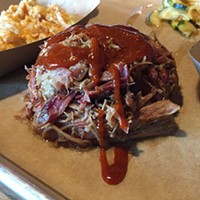
Seoul Food Meat Co's got soul
May 4, 2016 -

Aix en Provence flourishes in Myers Park
Apr 6, 2016 -
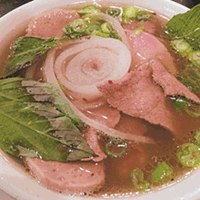
Pho and beyond at Saigon Bay Vietnamese Cuisine
Mar 2, 2016 - More »
Calendar
-

Haw River Wine Tasting @ Carolina Beer Temple.
-

Haw River Wine Tasting @ Carolina Beer Temple.
- Wed., April 24, 5-7 p.m.
-

TRIVIA THURSDAYS!!! @ Elizabeth Parlour Room
-

LIVE MUSIC FRIDAYS: TRACE CASANOVA @ Elizabeth Parlour Room at Hooligans FC
-

Charlotte Grilled Cheese Festival @ SouthEnd Station.
-
Three Questions for Barista Morgan Hopkins of Central Coffee
Java Master
-
Braised Chicken with Shallots 2
I don't think I'll be making this again, but hey, if you like shallots more than a fat kid likes cake, then go for it.
-
#hashtaghungry: Battle of the Sexes Cook Off, #BeautifulPplQC Brunch, more
The Social Eater picks a handful of filter-friendly, tweetable, social media-shareable foodie events in and around the city

